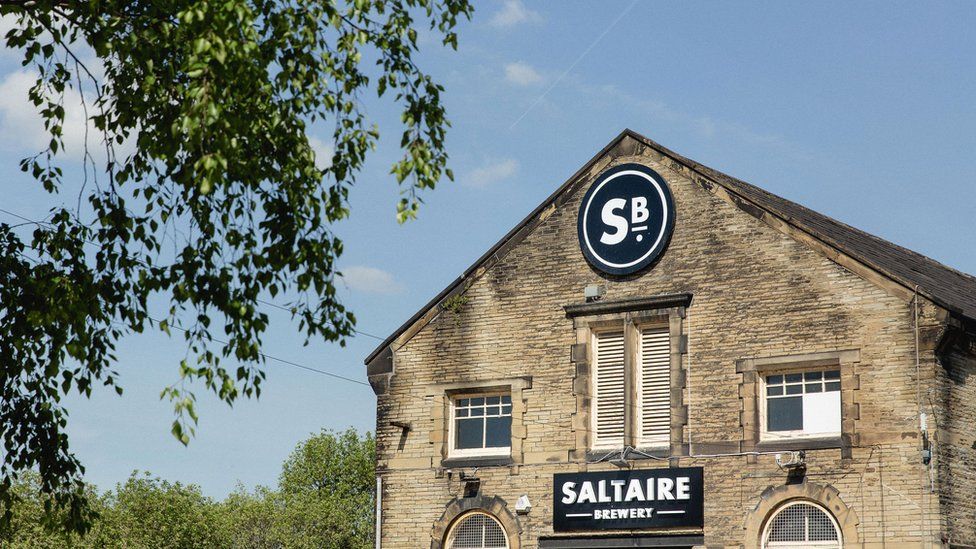
Saltaire Brewery said it had been “an incredibly hard time to navigate through”
This week’s news that North Yorkshire’s famous Black Sheep Brewery has gone into administration has saddened but not surprised independent brewers across the region.
Brewery bosses say they are being buffeted by a “perfect storm” of post-Covid debt, rising costs and uncertain demand.
According to the Society of Independent Brewers (SIBA), there are about 1,800 independent breweries in the UK.
BBC News spoke to some of them in Yorkshire about how they are dealing with the economic difficulties they face.
Great Newsome Brewery, East Yorkshire
Matthew Hodgson said the key was adapting to brew something people could afford
“The cost of raw materials, the cost of energy and the impact the current cost of living crisis is having on our customers and the consumers, that’s probably where we are seeing the most issues over the last few months,” explained Matthew Hodgson.
Director of the East Yorkshire’s Great Newsome Brewery, he said those costs could only be passed to customers “up to a point”.
“The last thing they [customers] want to hear repeatedly is us putting our prices up to cover our costs.”
Mr Hodgson said the company, which employs 10 people, had doubled its capacity with the opening of a new brewery in January 2020 and being a small business had survived the pandemic thanks to loyal customers.
However, rising costs meant there was a danger “the working man’s drink” would become very expensive, he warned.
“That is not something we ever wanted to do, and will try our utmost not to do,” he added.
Mr Hodgson said, in general, the brewing sector was finding it challenging to produce something “people can afford”.
Abbeydale Brewery, Sheffield
Abbeydale Brewery said it had faced challenges in sourcing equipment
Toby Grattidge, operations director at Sheffield-based Abbeydale Brewery, agreed there was a limit to how much of their rising costs could be passed onto the customer.
“Costs have gone up overall something like 15 to 20% over the last year and a half and what people can afford to, or are willing to pay for beer isn’t anywhere near that much,” he said.
“Everything you buy in general has gone up.
“Non-energy related stuff has gone up by between 8 to 11%, anything from pencils to paper.”
They were lucky to have been on a fixed tariff for their energy, without which “the sums get really grim, really really grim”.
Mr Grattidge said they faced other challenges, including the conflict in Ukraine disrupting the supply of parts for cooling equipment.
However, he said they were fortunate to own their buildings and were carrying very little debt, adding that Covid loans had been a “lifeline” for many.
“While we are not worried about the future, we are worried about other breweries, it is far from ideal trading conditions at the moment, it is very difficult.
“The oldest brewery in Sheffield, Kelham Island Brewery, closed last year.
“It was my first taste of real ale and it was a really sad day when that closed.”
Rooster’s Brewing Co, Harrogate
Ian Fozard said the industry was feeling the impact of short-term cost rises
In addition to rising costs, the country’s smaller breweries are also competing in a market dominated by the major global players, according to Ian Fozard, the North East regional director for SIBA.
Mr Fozard, who also manages Rooster’s Brewing, based in Harrogate, North Yorkshire, said: “There’s a perfect storm of issues that impact on smaller breweries.
“They don’t have the economy of scale of larger breweries and they don’t have the access to markets the larger brewers have.”
He said small independents who wanted to grow their businesses faced an uphill struggle due to the dominance of the big firms and the number of pubs who could only buy from a specific brewery.
Rooster’s is one of the larger independents, but like all companies it is feeling the impact of short-term cost increases.
“Our malt costs are up by 41% as a consequence of the Ukraine war and its impact on world grain markets,” Mr Fozard said.
They also saw the price for CO2, required for breweries that package beer in cans or pressurized kegs, more than double at one stage in 2022 due to reduced production and high demand.
Mr Fozard said many contracts also included a power surcharge which could be extremely high.
“I saw an invoice yesterday that had an 80% fuel surcharge for CO2 we bought in April and it’s very difficult to pass all your costs onto the marketplace,” he said.
Saltaire Brewery, West Yorkshire
Ewen Gordon said all their costs had gone up
Ewen Gordon, managing director at Saltaire Brewery, in West Yorkshire, said it had been “very hard” in the brewing industry, as it was in any manufacturing business.
Saltaire opened a new packaging plant in 2018 and he said energy prices had a big impact.
“The price of glass… has gone up probably by about 60% in the last 18 months because making glass takes a lot of energy.”
Saltaire is a medium-sized brewery with 35 employees and produces two million litres of beer a year.
Mr Gordon said there had been a surge in the independent brewing industry in recent decades which meant increased competition in a market that had not got any bigger.
“The amount of beer that is drunk is static,” he said.
What had changed was the behaviour of beer-drinkers in terms of where and how they chose to drink, he said.
He said there was also trading down, people choosing a cheaper product irrespective of brand loyalty.
“It has been an incredibly hard time to navigate through,” he added.
Related Internet Links
The BBC is not responsible for the content of external sites.
Source:
www.bbc.co.uk
Source link

